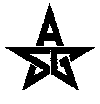

BruceMuseum.com
Greenwich, CT 06830 (203) 869-6786, Ext. 338
Astronomical Society of Greenwich info
 |
The Astronomical Society of Greenwich |  BruceMuseum.com |
| The
Bruce Museum, Museum
Drive Greenwich, CT 06830 (203) 869-6786, Ext. 338 Astronomical Society of Greenwich info |
Astronomical Society of Greenwich
Bruce Museum of Arts & Science
One Museum Drive
Greenwich, CT 06830
(203) 869-6786, Ext. 338
http://www.geocities.com/astrogreenwich
March 2001
Monthly Meeting
In lieu of our regular meetings for March and April, please attend the Bruce Museum's Blast Off! Series of dinner lectures.
Wednesday, March 7 ? "The NASA Space Program"
Richard J. Hieb, former astronaut
Vice President & Program Manager, Orbital Science Corporation
Wednesday, March 21 ? "Servicing the Hubble Space
Telescope"
George Hogan, Director, HST Program, B.F. Goodrich
Wednesday, April 4 ? "The Making of 2001: A
Space Odyssey"
Keir Dullea, actor, star of 2001
Frederick Ordway, Technical Advisor, 2001
We hope many of our members will support this series. (Many thanks to those who have signed up already!) If they're a success, it will pave the way for more science events in the future. The Bruce has provided us with a free meeting place for many years, and it's only right that we give something back. Besides, it's a bargain! Where else can you get dinner and a lecture for only $33.00?
Bowman Observatory Public Nights
(Weather Permitting)
March 13 & 27 ? 7-9 PM
April 10 & 24 ? 8-10 PM
May 8 & 22 ? 8:30-10:30 PM

1 - Moon in conjunction with Saturn
2 - First Quarter Moon in conjunction with Jupiter
8 - Moon at perigee (223,554 miles from Earth)
9 - Full Moon ? "Sap Moon"
15 - Moon in conjunction with Mars
16 - Last Quarter Moon
20 - Moon, at apogee (251,950 miles from Earth) in conjunction with Neptune
21 - Moon in conjunction with Uranus
22 - Moon in conjunction with Mercury
24 - New Moon
28 - Moon in conjunction with Saturn
29 - Moon in conjunction with Jupiter
Mars and the red star Antares ("rival of Mars") pair up again on the 4th. The Moon joins them on the 15th. (All three rise a little after midnight.)
Venus, still super-bright (mag.-4.5), drops rapidly from the evening sky this month, reaching inferior conjunction (passing between Earth and Sun) on the 30th. In a telescope, the planet will appear as a large crescent; as it moves closer to the Sun, its disk gets bigger but we see less and less of its lighted side.
By the way, Venus' passage in front of the Sun is not a transit (passing across the face of the Sun). Because Venus' orbital plane is tilted in relation to ours, transits are quite rare, with the next one occurring in 2004. This month the planet will in fact pass north of the Sun in our sky, with the result that we can see it in both the morning and evening sky for a few days beginning on March 20. (You can even see it in the daytime, if you know where to look; be careful to block out the Sun if you try this.) In April Venus moves into the morning sky for the rest of the year.
Jupiter and Saturn continue to dominate the evening sky, gracing the constellation Taurus, where the Moon visits them at the beginning and end of the month (see above).
Mercury is a morning planet this month, reaching greatest elongation (27º West) on the 11th, and greatest brilliancy (mag.0) on the 22nd. The Moon will be close by too, to help you spot it that morning.
Spring is here! Vernal Equinox takes place at 8:31 AM EST on March 20.